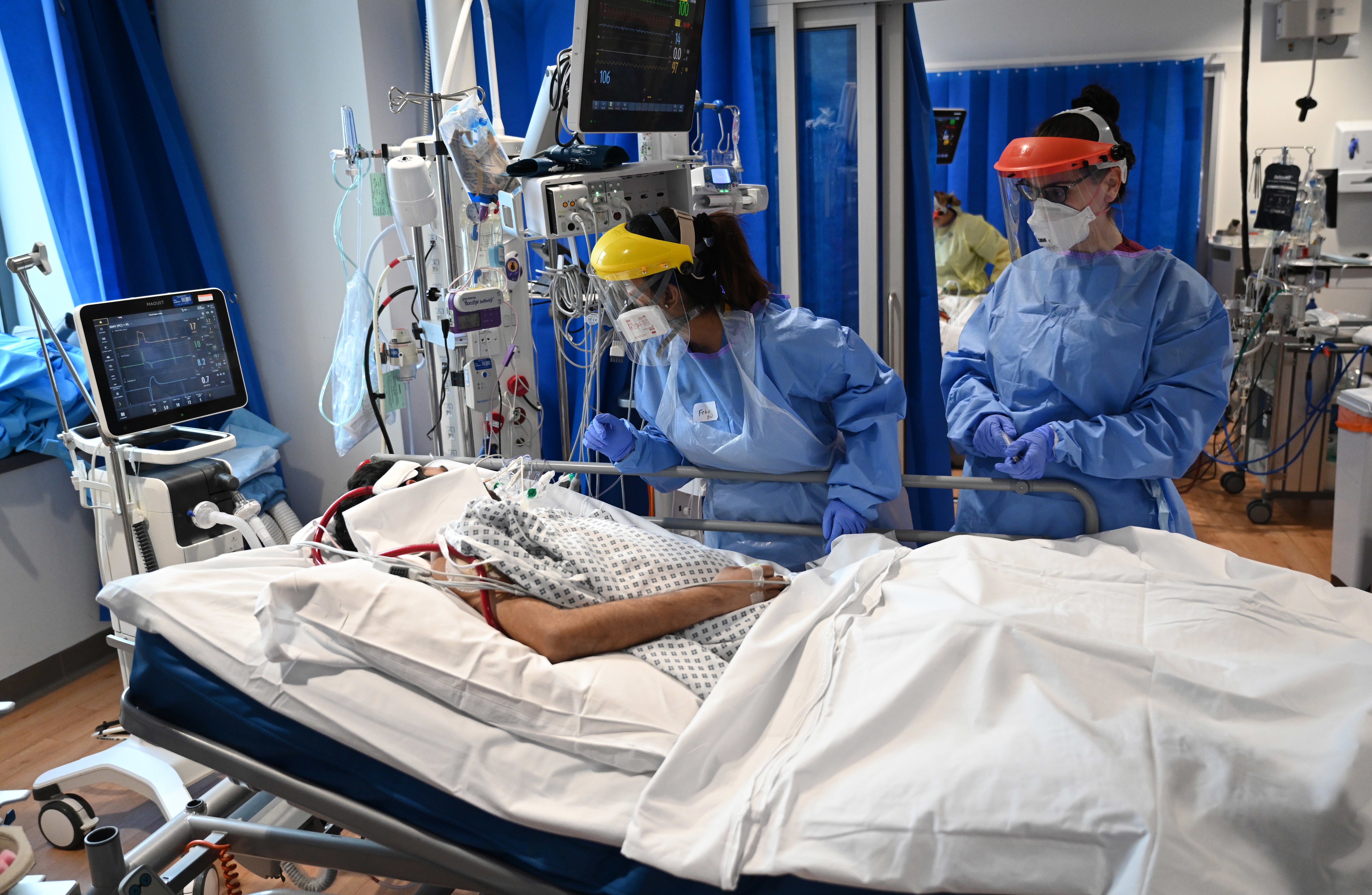Hospitals battle coronavirus outbreaks as workforce shortages drive cancellation fears
‘The last few winters have shown that the NHS is somewhere between 4,000 and 8,000 beds short of what we ideally need’

Your support helps us to tell the story
From reproductive rights to climate change to Big Tech, The Independent is on the ground when the story is developing. Whether it's investigating the financials of Elon Musk's pro-Trump PAC or producing our latest documentary, 'The A Word', which shines a light on the American women fighting for reproductive rights, we know how important it is to parse out the facts from the messaging.
At such a critical moment in US history, we need reporters on the ground. Your donation allows us to keep sending journalists to speak to both sides of the story.
The Independent is trusted by Americans across the entire political spectrum. And unlike many other quality news outlets, we choose not to lock Americans out of our reporting and analysis with paywalls. We believe quality journalism should be available to everyone, paid for by those who can afford it.
Your support makes all the difference.Hospitals across the north are battling rising numbers of Covid-19 outbreaks spreading on their wards as they juggle staff shortages and increasing numbers of patients being admitted with the virus.
As millions entered stricter lockdown measures on Wednesday, there were 4,146 patients in English hospitals with a total of 19,724 testing positive for the virus in the previous 24 hours and another 137 deaths reported across the UK.
Mounting pressure has already led to some hospitals warning they will be forced to cancel routine surgeries with others now redeploying nurses and doctors to cope with the second wave surge.
The Royal Liverpool University Hospital is looking after more than 250 patients with Covid-19 with Councillor Paul Brant, the city’s cabinet member for health, saying the trust’s intensive care beds were 90 per cent full.
And in the northeast, NHS staff fear there will not be enough staff to man the Nightingale hospitals, which were put on standby this week. NHS England said that at the start of this month almost 20,000 NHS staff were absent from work due to being sick with Covid-19 or self-isolating.
Increase in cases has also led to warnings that hospitals could again be forced to cancel large numbers of routine operations – potentially adding thousands more to growing NHS waiting lists.
A report on the numbers of outbreaks in the northeast and Yorkshire region, seen by The Independent, revealed there were 70 separate Covid-19 outbreaks in hospitals and care homes on Monday.
The report said South Tees Hospital Trust had seven separate outbreaks of Covid-19, with Newcastle upon Tyne Hospitals Trust and Tees, Esk and Wear Valley Trust each having six separate outbreaks.
South Tyneside and Sunderland Trust had five outbreaks while hospitals in Sheffield, Leeds, Mid Yorkshire and Huddersfield all had at least four outbreaks on wards. Other hospitals in Doncaster, North Tees, Durham, Bradford and Barnsley had at least two separate outbreaks.
There were 37 care homes reporting outbreaks of Covid-19 across the northeast and Yorkshire
One chief nurse in the northeast region told The Independent hospitals would have no choice but to stop planned operations because there was an overall lack of staff.
“There is huge concern about how the Nightingale hospital in Sunderland can be staffed safely without impacting on activity. Without stopping routine activity it’s unlikely they can be staffed. It’s all window dressing.”
One surgeon who is seeing the impact on his patients told The Independent: “Every winter is crap but we all knew this winter would be worse. Non-urgent elective patients are screwed. We will be back to 18-24-month waits for things like joint replacements. I’m currently operating on patients that were cancelled in April and are now 52-week breaches.”
An intensive care doctor working in the northwest said his hospital was experiencing “staffing shortages across the board”.
He added: “Numbers continue to rise, with more in last night. We’re into our escalation planning meaning redeployment of additional staff to critical care at the expense of available anaesthetists to elective theatre sessions.
“NHS England seem deluded and appear to be pushing trust executives to repeat their mantra. They clearly want to keep public confidence to seek medical help when needed but failing to highlight the NHS needing public support to keep going means we’ve got idiotic scenes like Liverpool last night.”
Helen Buckingham, director at the Nuffield Trust think tank, said: “I think it is unlikely the NHS will continue to deliver the same level of planned services it has been asked to during the next six months.
“I don’t think it can be fixed easily, we are not going to send nurses from Penzance to Penrith. There is a limit to what can be done. We won’t have a blanket stop in the way that we did before. People in the NHS are very concerned about those patients who were left behind by the earlier pause.”
She added: “Some places will be better able to carry on than others. We will see a very differential picture in the next three to six months. The pressure on nursing is still going to be the biggest concern.”
At Nottingham University Hospitals Trust, one of the largest trusts in England, managers urged department heads to discharge patients if they were ready to go home because of “high pressure” in the trust’s accident and emergency department “mainly because of Covid”.
The trust’s city hospital has had to close wards because of Covid outbreaks with some staff also testing positive.
A message to consultants on Tuesday said: “Admissions to [Nottingham University Hospital] are way past 100 and rising fast. There are also outbreaks of Covid on certain wards which have resulted in the closures of beds. I am afraid the elective programme [routine operations] is going to be disrupted but we are doing everything we can to preserve as much elective work as possible.”
A spokesperson for the hospital said it remained open to patients both with and without coronavirus, adding: “Hospital admissions have increased as community infection rates in Nottingham have risen, which is why we need the public to follow the government guidance to control further transmission and save lives.”
Chris Hopson, chief executive of NHS Providers, told The Independent: “Everyone in the NHS is acutely aware of the need to keep going with non-Covid care. The NHS will do all it possibly can to try and preserve the full range of services at full activity levels.
“NHS England has rightly set trusts a very high bar before they reduce elective activity but hospitals are between 10 and 30 per cent down on capacity and staff are exhausted. It is too early to say that large-scale cancellation of elective surgery is inevitable. There may be some trusts who are particularly badly affected by a large second Covid surge. But the impact on services will depend on the geography of the disease, how much capacity each affected hospital has and whether hospitals have neighbouring trusts or local independent sector hospitals able to support them.
“The last few winters have shown that the NHS is somewhere between 4,000 and 8,000 beds short of what we ideally need and we are also carrying around 80,000 staff vacancies.
“This is why we are we are saying the government has to go hard and fast on tough local lockdowns wherever they are needed. We have to minimise the number of Covid cases the NHS is treating, so we have enough capacity to treat all patients who will need our help this winter.”
NHS England declined to answer questions on how many outbreaks there were in hospitals but a spokesperson said: “Across most of the NHS the ‘window of opportunity’ for extra elective operating is still fully open, since Covid inpatient numbers in most of England is still low.
“But there is a lag between community infection and hospitalisation, and in geographies where Covid admissions are rapidly increasing it is obviously putting pressure on non-urgent care. That is why it is vital that public measures to cut infection growth succeed, and it’s why each area has flexibility to respond based on its particular local pressures, with a local contingency plan based on various Covid second wave scenarios.”



Join our commenting forum
Join thought-provoking conversations, follow other Independent readers and see their replies
Comments